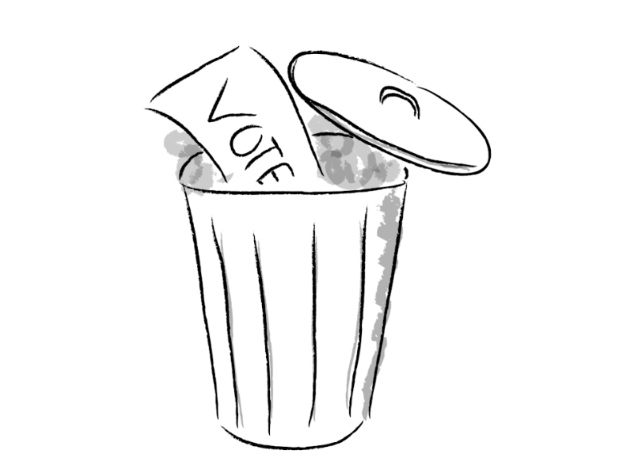The fruitless franchise: votes don’t lead to change
According to staff writer Joey McEvoy, voting fails to inspire meaningful change in government.
June 2, 2018
Millions flock to the ballot boxes to cast their votes for the next politician that will dictate their country’s policies. The idea of widespread voters gathered to make change is a constant “go America” moment seen throughout election cycles. But through this action the public participate in a false sense of choice. Voting is pointless.
An average American would instantly get offended by this remark, but I have one question. If you think voting is even slightly effective in enacting change, according to pbs.org, why is eligible voter turnout only about 58 percent?
Just to put it out there, America is not a democracy where the whole populace votes on every issue and majority rules. It is a republic where people vote to elect representatives that vote for them. These representatives don’t always follow through on their voters’ wishes; They just appear to comply with the ultimate goal of getting elected and then pursuing their own thoughts. It’s one where the presidential elections are not decided by the popular vote, but instead they are decided by the electoral college. The Constitution was carefully crafted and from what I learned in AP US History the decision to put this system in the Constitution was for a reason: the fear of mob rule. The founding fathers saw the dangers in a direct democracy; timely, majority subjugating the minority, costly, overall incompatible with a large population, so they created the illusion of democracy by providing the menial popular vote.
Four times in American history a president was elected that lost the popular vote, most recently Donald Trump. If the power is in the hands of the people, would that really happen?
The United States House of Representatives is elected directly, so this should give the concept of voting some hope, but no. The voting ballots can be manipulated and the accusations of such manipulations are not uncommon. For example, according to the New York Times, in 2016, the secretary of State Kansas, Kris Kobach, took his case to court urging for increased identification at the voter polls to combat his assumptions of widespread voter fraud.
Most politicians can be traced to financial backing, the money supplied determine the politician’s platform and advertising, and that money can buy elections. In 2010, a Supreme Court ruling Citizens United v. Federal Election Commission allowed unlimited campaign contribution by corporations and unions that can remain anonymous. How can we even trust the people that we vote for to make change in our favor? They say what the voters want them to say to get elected, but what the corporations and financial backers want is what they do. This occured recently when it was uncovered that the head of the Environmental Protection Administration is tied to several major oil companies and is helping loosen the laws, according to the Washington Post.
Our votes aren’t enacting change. When you hear the frustrations of the public with the politicians they voted for, hopefully this will become clear.
Voting is an illusion of choice. If you are so desired to make a change, don’t rely on the traditional voting system. Don’t rely on the government to fix your issues, band together and take action yourselves. Put the power back into the people’s hands.










